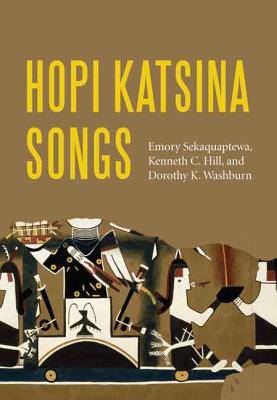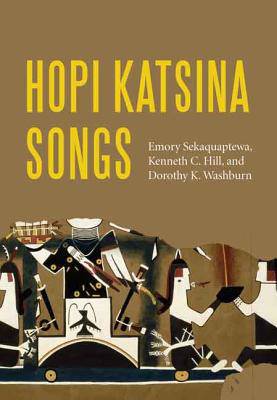
Door een staking bij bpost kan je online bestelling op dit moment iets langer onderweg zijn dan voorzien. Dringend iets nodig? Onze winkels ontvangen jou met open armen!
- Afhalen na 1 uur in een winkel met voorraad
- Gratis thuislevering in België vanaf € 30
- Ruim aanbod met 7 miljoen producten
Door een staking bij bpost kan je online bestelling op dit moment iets langer onderweg zijn dan voorzien. Dringend iets nodig? Onze winkels ontvangen jou met open armen!
- Afhalen na 1 uur in een winkel met voorraad
- Gratis thuislevering in België vanaf € 30
- Ruim aanbod met 7 miljoen producten
Zoeken
€ 99,45
+ 198 punten
Omschrijving
Emory Sekaquaptewa dedicated most of his life to promoting Hopi literacy and creating written materials to strengthen the language and lifeway of his people. He understood how intimately cultural ideas are embedded in language, and by transcribing and translating early recordings of katsina songs he helped strengthen the continuity of Hopi religious thought and cultural practices. Sekaquaptewa believed that the advice contained in the katsina songs, some of which were recorded over a century ago, could be used by future generations as guideposts for navigating contemporary life.
Hopi Katsina Songs contains Hopi transcriptions, English translations, and detailed commentaries of 150 katsina songs, recorded throughout the twentieth century from all three Hopi mesas, as well as twenty-five recorded by Sekaquaptewa himself. To further continue the creative process of the Hopi legacy, Sekaquaptewa included song fragments with the hope that readers would remember the songs and complete them. These features make his collection an invaluable resource for preserving and teaching Hopi language and culture.
Hopi Katsina Songs contains Hopi transcriptions, English translations, and detailed commentaries of 150 katsina songs, recorded throughout the twentieth century from all three Hopi mesas, as well as twenty-five recorded by Sekaquaptewa himself. To further continue the creative process of the Hopi legacy, Sekaquaptewa included song fragments with the hope that readers would remember the songs and complete them. These features make his collection an invaluable resource for preserving and teaching Hopi language and culture.
Specificaties
Betrokkenen
- Auteur(s):
- Uitgeverij:
Inhoud
- Aantal bladzijden:
- 436
- Taal:
- Engels
Eigenschappen
- Productcode (EAN):
- 9780803262881
- Verschijningsdatum:
- 1/03/2015
- Uitvoering:
- Hardcover
- Formaat:
- Genaaid
- Afmetingen:
- 152 mm x 229 mm
- Gewicht:
- 789 g

Alleen bij Standaard Boekhandel
+ 198 punten op je klantenkaart van Standaard Boekhandel
Beoordelingen
We publiceren alleen reviews die voldoen aan de voorwaarden voor reviews. Bekijk onze voorwaarden voor reviews.











